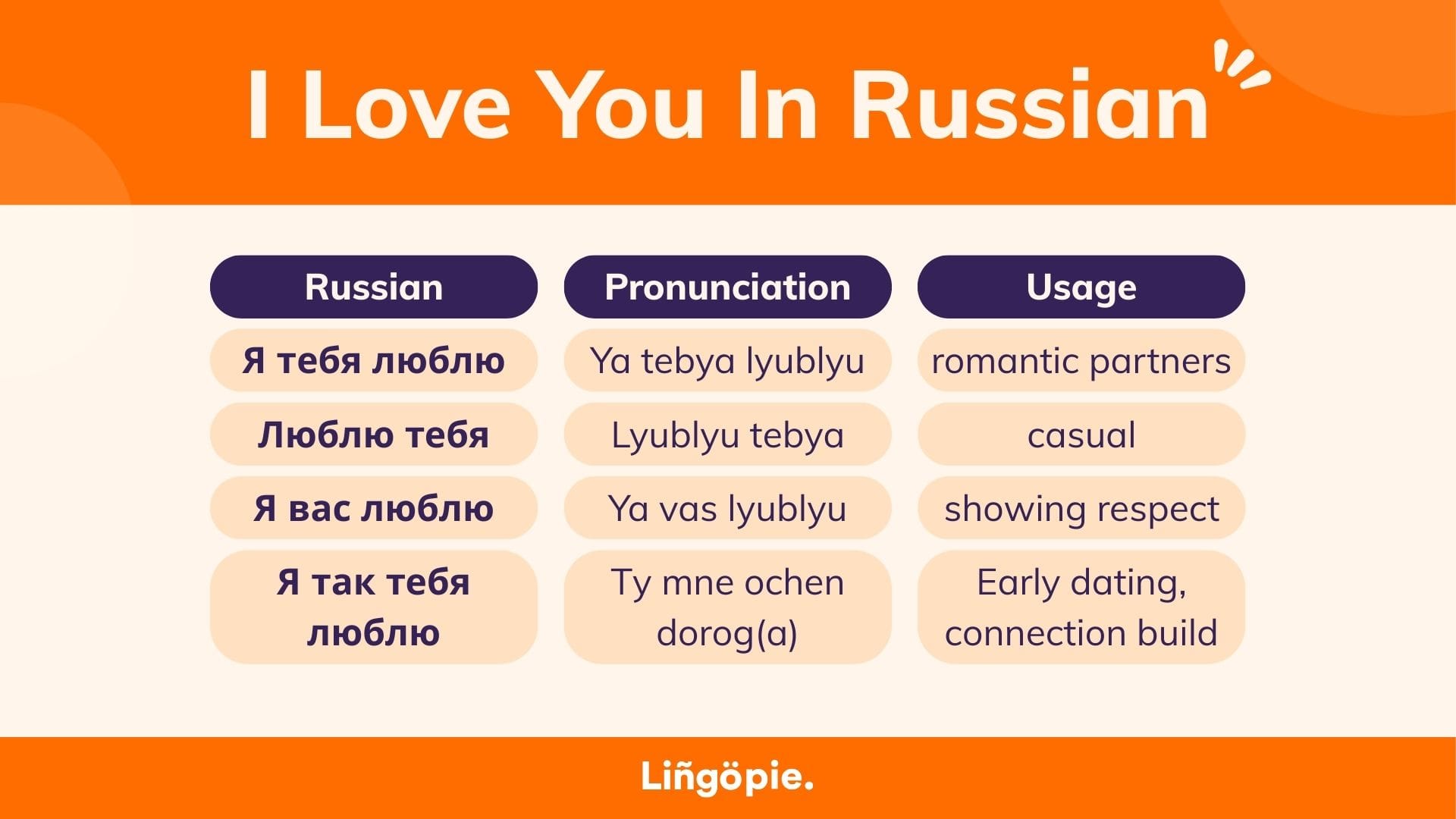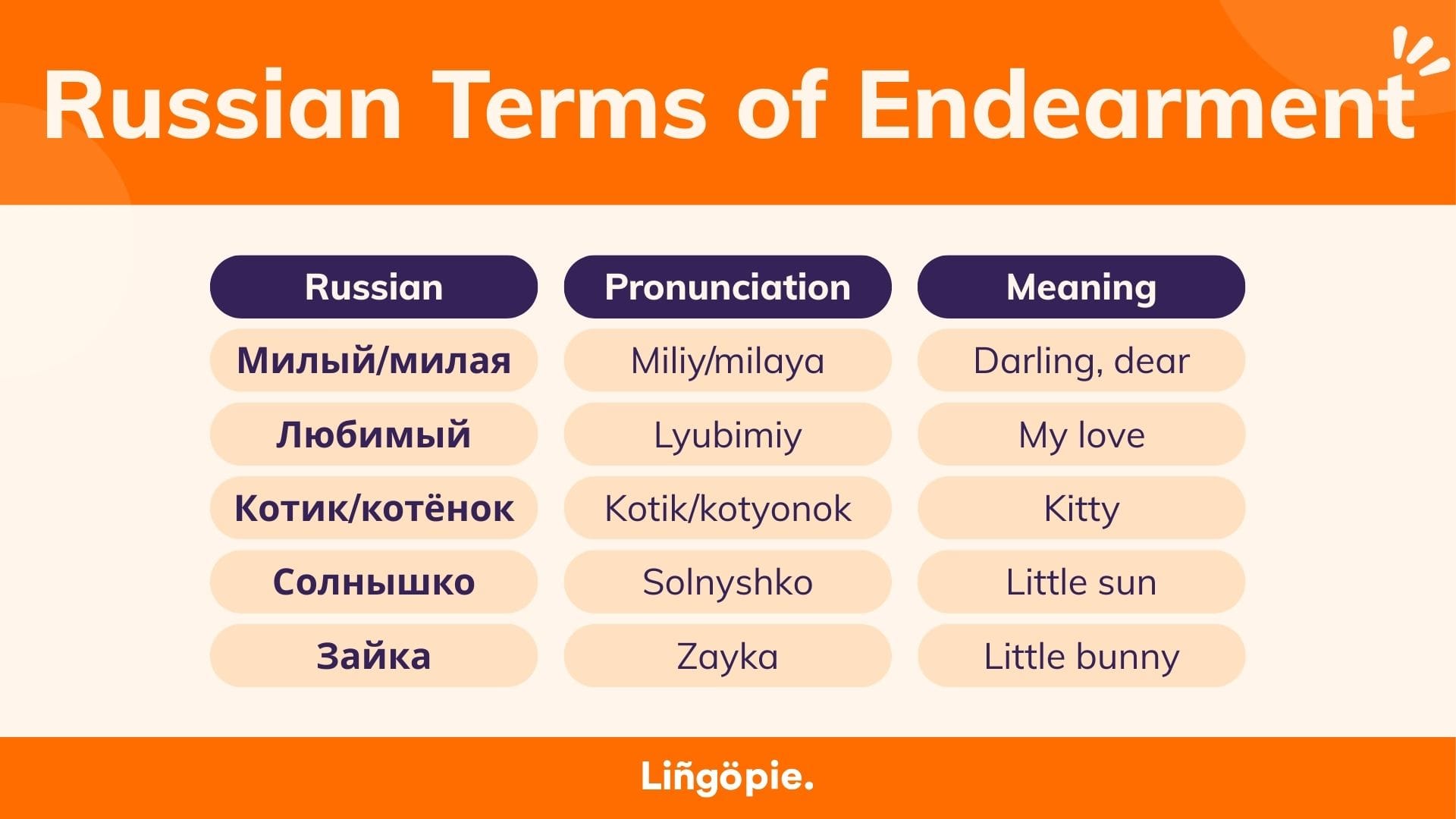Dating someone who speaks Russian? With only 6% of Russians using dating apps, the culture values genuine connections and expressing feelings naturally. That's why learning Russian romantic phrases helps you communicate in ways that feel real and meaningful.
In this guide, I'll teach you how to say I love you in Russian and share everyday romantic expressions that show you care. You'll learn sweet nicknames and terms of endearment that Russian speakers use when dating, helping you build authentic connections at every stage of your relationship.
- 5 Best Russian Learning Websites You Should Try
- 5 Best Russian Documentaries To Watch To Learn Russian
- 14+ Crazy Russian Swear Words, Insults, And Curses For Beginners

How To Say I Love You In Russian
The literal translation of “я тебя люблю” is “I love you,” and it’s the most common way of declaring romantic feelings in the Russian language. This phrase breaks down simply: "я" (ya) means "I," "тебя" (tebya) means "you," and "люблю" (lyublyu) means "love."
If you want a formal version, you can say я люблю вас, which is appropriate in respectful or formal contexts, though it’s rarely used in romantic situations.
There are also different ways to express love depending on the depth of your feelings and the stage of the relationship.
| Russian Phrase | Pronunciation | Meaning | When to Use |
|---|---|---|---|
| Я тебя люблю | Ya tebya lyublyu | I love you | For romantic partners, serious relationships |
| Люблю тебя | Lyublyu tebya | Love you | More casual, everyday version |
| Я вас люблю | Ya vas lyublyu | I love you (formal) | For showing respect, speaking to older people |
| Я так тебя люблю | Ya tak tebya lyublyu | I love you so much | For emphasizing strong feelings |
| Я люблю тебя всем сердцем | Ya lyublyu tebya vsem serdtsem | I love you with all my heart | For deeply romantic moments |
| Ты мне очень дорог(а) | Ty mne ochen dorog(a) | You're very dear to me | Early dating, building connection |
To say "I love you" with someone's name in Russian, simply add their name after the phrase. For example, "Я тебя люблю, Саша" (Ya tebya lyublyu, Sasha). Remember that Russian names often change form when used in direct address - this special form is called the vocative case. Keep the comma before the name, just like in English.

Terms of Endearment in Russian
Whether you're just starting to date or in a long-term relationship, understanding how love is expressed in the Russian language based on nicknames can help you connect on a deeper level. Here's your guide to the most common Russian terms of endearment:
| Russian Term | Pronunciation | Meaning | When to Use |
|---|---|---|---|
| Милый/милая | Miliy/milaya | Darling, dear | Everyday affection |
| Любимый/любимая | Lyubimiy/lyubimaya | My love | For romantic partners |
| Котик/котёнок | Kotik/kotyonok | Kitty | Cute, playful nickname |
| Солнышко | Solnyshko | Little sun | Sweet, warm affection |
| Зайка | Zayka | Little bunny | Playful, tender nickname |
| Дорогой/дорогая | Dorogoy/dorogaya | Dear one | Common term of affection |
| Родной/родная | Rodnoy/rodnaya | My dear, my own | Deep emotional connection |
| Золотце | Zolotse | Golden one | Precious person |
| Ласточка | Lastochka | Little swallow | Gentle, caring nickname |
| Сердце моё | Serdtse moyo | My heart | Deep romantic affection |
| Душа моя | Dusha moya | My soul | Intimate, close relationship |
| Радость моя | Radost moya | My joy | Happy, loving expression |
These sweet nicknames work best when you understand the relationship context. Start with simple terms like милый/милая (miliy/milaya) or дорогой/дорогая (dorogoy/dorogaya) in newer relationships. As your connection grows, you can move to more intimate terms like любимый/любимая (lyubimiy/lyubimaya) or душа моя (dusha moya).

Romantic Expressions in Russian
Early Dating Phase
During the early stage of dating, you might express admiration for someone’s beautiful eyes, say you enjoy talking with them, or mention how peaceful you feel in their presence. These softer love phrases are more suitable before you start openly declaring deep commitment.
| Russian Expression | Pronunciation | Meaning |
|---|---|---|
| Ты мне нравишься | Ty mne nravishsya | I like you |
| Хочу тебя увидеть | Hochu tebya uvidet | I want to see you |
| Я скучаю | Ya skuchayu | I miss you |
| Думаю о тебе | Dumayu o tebe | Thinking of you |
| С тобой хорошо | S toboy horosho | It's good with you |
| Ты особенный/особенная | Ty osobenniy/osobennaya | You're special |
| Мне с тобой спокойно | Mne s toboy spokoyno | I feel peaceful with you |
| Рад(а) тебя видеть | Rad(a) tebya videt | Happy to see you |
Another strong romantic expression is я тебя обожаю, which means “I adore you.” This phrase is often used when someone has completely fell in love — sometimes even describing love at first sight.
Getting Serious
As feelings grow stronger, conversations may naturally shift toward shared dreams, future plans, or even whether you want to marry someday. Expressions at this stage often emphasize loyalty, long-term happiness, and emotional security.
| Russian Expression | Pronunciation | Meaning |
|---|---|---|
| Ты много значишь для меня | Ty mnogo znachish dlya menya | You mean a lot to me |
| Не могу без тебя | Ne mogu bez tebya | Can't be without you |
| Хочу быть с тобой | Hochu byt s toboy | I want to be with you |
| Ты делаешь меня счастливым(ой) | Ty delayesh menya schastlivym(oy) | You make me happy |
| Мы созданы друг для друга | My sozdany drug dlya druga | We're made for each other |
| Ты моя вторая половинка | Ty moya vtoraya polovinka | You're my other half |
| Я всегда буду рядом | Ya vsegda budu ryadom | I'll always be by your side |
| Только ты | Tolko ty | Only you |
Long-term Relationship
In Russian culture, roses and hearts are common symbols of love. Flowers (especially red roses) are often given during important romantic milestones, and heartfelt expressions are typically paired with meaningful gestures rather than exaggerated public displays.
For those deep, lasting relationships, use these expressions to show your enduring love:
| Russian Expression | Pronunciation | Meaning |
|---|---|---|
| Я буду любить тебя вечно | Ya budu lyubit tebya vechno | I'll love you forever |
| Ты моя судьба | Ty moya sudba | You're my destiny |
| С тобой я дома | S toboy ya doma | With you I'm home |
| Мы одно целое | My odno tseloye | We are one |
| Люблю тебя всей душой | Lyublyu tebya vsey dushoy | Love you with all my soul |
| Ты мой смысл жизни | Ty moy smysl zhizni | You're my reason for living |
| Каждый день люблю сильнее | Kazhdyy den lyublyu silneye | Love you more each day |
| Навсегда твой/твоя | Navsegda tvoy/tvoya | Forever yours |
In long-term relationships in Russia, emotional expressions often become calmer but deeper. Love becomes less about dramatic gestures and more about what truly matter — commitment, trust, and showing up even when life feels tired or overwhelming.
Specific Romantic Compliments in Russian
Compliments can also highlight personality traits, sense of humor, or how someone makes you feel less crazy during stressful moments. Even simple praise can build emotional closeness when expressed sincerely.
Here's how to express what you love about them in Russian - from their smile to their personality:
| Russian Expression | Pronunciation | Meaning |
|---|---|---|
| Я люблю твою улыбку | Ya lyublyu tvoyu ulybku | I love your smile |
| Обожаю твои глаза | Obozhayu tvoi glaza | I adore your eyes |
| Люблю твой смех | Lyublyu tvoy smekh | I love your laughter |
| Люблю твой голос | Lyublyu tvoy golos | I love your voice |
| Мне нравится твоё чувство юмора | Mne nravitsya tvoyo chuvstvo yumora | I like your sense of humor |
| Люблю, как ты думаешь | Lyublyu, kak ty dumayesh | I love how you think |
| Обожаю твой характер | Obozhayu tvoy kharakter | I adore your personality |
| Люблю твою доброту | Lyublyu tvoyu dobrotu | I love your kindness |
| Мне нравится твоя честность | Mne nravitsya tvoya chestnost | I like your honesty |
| Я люблю твою нежность | Ya lyublyu tvoyu nezhnost | I love your tenderness |
Remember to match gender endings in Russian - use твой (tvoy) for masculine nouns and твоя (tvoya) for feminine ones. Want to emphasize your feelings? Add очень (ochen - very) before люблю or нравится to make your compliment stronger.
Here are some additional romantic compliments you can use:
- Ты такая красивая means You are so beautiful in Russian.
- Ты такой красивый means You are so handsome in Russian.
- Ты - лучше всех на свете means You are better than anyone else in the world in Russian.
- Ты - лучше всех на свете means You are better than anyone else in the world in Russian.
- Ты такой милый means you are so lovely/cute in Russian when addressing a man.
- Ты такая милая means you are so lovely/cute in Russian when addressing a woman.
These expressions are commonly used in romantic contexts and feel warm, natural, and heartfelt when spoken sincerely.
- I Love You in Portuguese: A Complete Guide to Romantic Expressions
- How To Say I Love You In Italian Like A Native Speaker [Guide]
- How To Say I Love You In Dutch: 10+ Ways To Express Love
Ready To Go Beyond I Love You In Russian?
To truly understand how these phrases sound in real conversations, it helps to listen to native speakers using them naturally in context. This is why most native speakers recommend watching Russian shows with interactive subtitles. This lets you hear pronunciation, tone, and even emotional nuance through real audio examples.
In this regard, Lingopie helps you learn Russian naturally through authentic Russian TV shows and movies, where you'll hear how locals really use these romantic phrases in context.
With Lingopie, you'll pick up more than just words - you'll understand when to use each expression, hear the right pronunciation, and learn about Russian dating culture along the way. Start your Russian learning journey on Lingopie today and move beyond basic translations to genuine cultural connections.
Frequently Asked Questions About Russian Love Expressions
Below are direct answers to some of the most common questions about Russian romantic expressions.
What does Lyublyu Tebya mean?
Lyublyu tebya (Люблю тебя) means “Love you” in Russian. It’s a slightly more casual version of “Я тебя люблю” but still expresses genuine romantic affection.
What is the most romantic Russian phrase?
“Я люблю тебя всем сердцем” (Ya lyublyu tebya vsem serdtsem) is considered one of the most romantic Russian phrases because it means “I love you with all my heart.” It expresses deep, sincere, and wholehearted love.
Is "я тебя люблю" too strong for early dating?
Yes - Russians take this phrase seriously. For new relationships, start with lighter expressions like "ты мне нравишься" (I like you) or use sweet compliments. Save "я тебя люблю" for when you feel deep, romantic love.
How do pronunciation endings change for male and female speakers?
When using adjectives or certain verbs, endings change based on the speaker's gender. For example, рад (rad) for male speakers becomes рада (rada) for female speakers. This shows up in phrases like "я рад/рада тебя видеть" (I'm happy to see you).
What's the difference between formal and informal "you" in Russian?
Use ты (ty) for romantic partners, friends, and informal situations. Use вы (vy) for formal situations or showing respect to older people. In romantic contexts, you'll mostly use ты unless you're speaking formally to someone's parents.
When can I start using Russian terms of endearment?
Start with simple terms like "милый/милая" (dear) after you've been on several dates. More intimate terms like "любимый/любимая" (my love) or "душа моя" (my soul) are better saved for established relationships.
How important is it to get the stress and pronunciation right?
Very important - Russian words can change meaning based on stress. With Lingopie, you can hear native speakers use these phrases naturally and practice the correct pronunciation by watching Russian shows and movies with interactive subtitles.




![How To Say Love In Different Languages [120+ Ways]](/blog/content/images/2024/11/How-To-Say-Love-In-Different-Languages--120--Ways-.jpg)



![11 Best Apps to Learn Russian Language [TESTED]](/blog/content/images/size/w300/2026/01/Apps-to-learn-russian.jpg)
